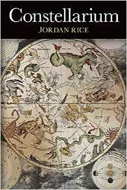 Jordan Rice
Jordan Rice
Constellarium
Orison Books, Inc.
ISBN-13: 978-0-9906917-7-8
Reviewer: Cindy Hochman
Someone tells a joke. “Where do they put
a missing tranny’s photo? On cartons of
half and half.”
—Jordan Rice, “The Living Is Easy”
The heartrending and harrowing poems in Jordan Rice’s Constellarium underscore the difference between poetry and politics, despite the fact that the two sometimes overlap. When seen through a political prism, the word transgender is often reduced to bigotry and bathrooms; in poetry, however, the issue of gender identity has a name and a face, and most importantly, a self and a voice. A poet’s stock-in-trade is, of course, revision, and Rice has undergone the ultimate revision: bodily and psychic, and with it, a first-hand understanding of the human propensity toward savagery, and a reassessment of absolution, mercy, and compassion. From “My Life”:
Life won’t be simple either way and, it’s an
impossible choice. I take a year. Then advice.
Lose weight now. Grow out your hair. Unlearn
hiding.
Childhood memories in a particular regional setting can serve, in many ways, as a guidepost to a collection of poetry, but even more markedly so in this collection, as one imagines the amount of hiding that a confused child had to do within the confines of the ringed apple trees and wolves-among-the-pines of the small-town South, with its big-time conservative social conventions and codes. But perhaps there was also comfort in a place so redolent with the verisimilitude of the natural world, where everything is allowed to just be what it is, as Rice was striving to make sense of her own physicality and true nature. From “Lost Body”:
…I am coming out
to my mother, over the phone, temperate zones away, saying
how I must change, that I cannot stand this body any longer,
the one she remembered
held and fed and would not hold only once—when I fell
beneath the rear tractor wheel, rolled under before anyone
could stop the bush hog. This is the story she is telling me now—
…
—that she stood over me in that field
only thinking: my son my son
There is plenty of symbolism in the macho machinery of a tractor rolling over and scarring an already-scarred son who longs to be a daughter. In “Transition With Harvard Sentences,” Rice repeats the phrase “I took away the masculine,” and yet, endless emblems of the traditional male role permeate the poems: target practice at a shooting gallery (“Inheritance”), identification with soldiers and the war in which her uncle fought (“our grandfather ashen and grinding, in the dream maw of his night, the bones of dead soldiers”), and more than a few scenarios ending in brute force and blood. And in the very first poem, “Laser Therapy,” a pulling of the trigger is the metaphor used to denote the treatment that results in a singed beard (“I took away my masculinity”).
…Even speech—
the clear-spoke & the speaking, my mind’s a-roar in
hoary rasp. No voice carries. I try every one, even
apology & rhetoric: the apsis of our fall. Listen.
Around us whirs the sex I’m to become—violent,
exact. I etch up another voice within your silence.
Say, I’m sorry. Say I am sorry. Say I had no choice.
I lost one self to this other & killed our child’s father.
He’ll keep me in old photos: thin frame, red beard.
Barbarossa, our priest once called me. What will he
tell our son?
In the above-quoted excerpt from “Epithalamion,” the themes of violence and voice are conflated, but the voice is not the poet’s alone. There is a father and a mother whose distant but distinct voices express bewilderment and concern (in “Gresham Court,” Rice’s father questions “How will you live this way?”); there is an ex-wife whose presence is extant throughout; and, most poignantly, there is a young son caught within the transition. Although, in one memory, Rice admits “Soon, I am four and have not yet spoken,” this voice is recaptured later, when Rice declares that “Brave is not immobility, is not speechlessness.” While the bulk of the poems are executed in an autobiographical voice with real-life accounts, Rice effectively uses dreamscapes and hypnotic fragments to convey a sense of onrushing thoughts and anxious preoccupations, as in “Folie à Deux”:
In the story of the boy in the water, the boy was put in the earth
before too long, and my father did not attend the service
or was not invited. For who would wish to meet the man
who confirmed the fear of a son drowning himself?
Mesmeric images of drowning recur in several fever-dream sequences, as does abduction of a child (a reader might very well infer that this “kidnapped child” represents the poet’s selfhood), and in narrating her own trajectory and evolution, Rice seems to gather up the whole of the world’s losses. Reading Constellarium, I think of Sylvia Plath’s poem “Tulips”—specifically, the line “I have wanted to efface myself.” In a sense, Rice has, in fact, effaced the bearded father, husband, and son she was, and certainly not without consequence (it is telling that the final poem is entitled “Saudade,” which is synonymous with melancholy, longing, and nostalgia). The trope of drowning is especially illustrative, given the religious connotations of submergence in water: cleansing of sin, purification, rebirth, re-creation.
You may heretofore not have known anyone in the transgender community. But now you do, and her name is Jordan Rice. Through these harsh but magnificent and unblanching poems, she blurs the genders and dares us to walk in her shoes. In startling lines that render her vulnerable and lead us to empathize with her struggle, she reminds us that although her voice and body have undergone radical changes, her crux and core remain constant.

